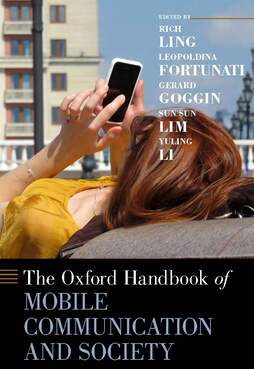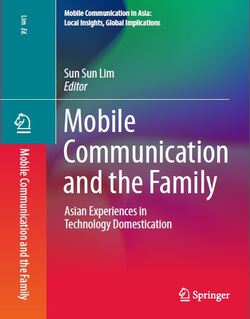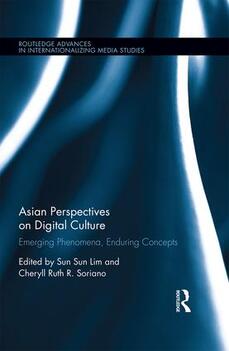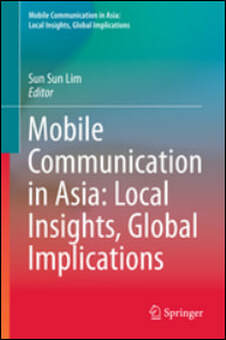Books
|
My latest book Digital Parenting Burdens in China (Emerald Publishing, 2024) is the first English language book to explore the impact of digitalisation on family life in China, including the phenomenon of ‘punch-in culture’ and its implications for family wellbeing. Delving into 90 interviews from both before and during the Covid-19 pandemic, we provide rich vignettes of family life in urban Chinese households in Beijing and Hangzhou to demonstrate how parents appropriate technology as they raise their children, steer them towards the social aspirations of academic achievement, and navigate the rocky terrains of children’s home-based learning during the pandemic lockdowns. Empirically grounded and theoretically informed, these vivid accounts serve as valuable insights into understanding how family life around is shifting in the face of digitalisation not only in China, but globally.
Open-access via Emerald. Praise for Digital Parenting Burdens in China “Lim & Wang’s book provides us with a rare peek into the world of family life in China, a global technological leader, as it is embracing digitalization in all aspects of its life: Parenting, education, leisure, and social relationships. Their thoughtful empirically based observations in this unique culture are highly valuable for readers worldwide well beyond China as they raise the challenges and opportunities facing all families adjusting to the ever-changing digital advancements in their everyday lives.” Dafna Lemish, Distinguished Professor of Journalism and Media Studies, Rutgers University “A definitive volume, this book offers nuanced analysis about children, parenting, and digital media in urban China. The implications are, of course, far beyond China as AI and tech-facilitated practices fundamentally transform parenting itself, wherever you are.” Jack Linchuan Qiu, Shaw Foundation Professor of Media Technology, Wee Kim Wee School of Communication and Information, Nanyang Technological University “In this insightful and timely book, Sun Sun Lim and Yang Wang provide a groundbreaking exploration of the burdens Chinese parents face due to the digitalization of family life and intensifying academic pressures. Empirically rich and theoretically nuanced, this book offers invaluable guide to anyone seeking to understand the evolving strains and shifting dynamics of parenting in a digitalizing world.” Bingchun Meng, Professor, Department of Media and Communications, London School of Economics & Political Science “Parenting and family life are not what they used to be, particularly since COVID. Many of the tasks and events that marked family life have been changed via digitalization, such as online shopping, gaming and social networking. In their book Digital Parenting Burdens in China: Online Homework, Parent Chats and Punch-in Culture, Lim and Wang walk us through these changes as experienced in urban China. Thanks to the work of Lim and Wang, this book provides us with perhaps the first glimpse into digital parenting in China. A must-read.” Rich Ling, author of Taken for Grantedness: The Embedding of Mobile Communication into Society (MIT Press, 2012) “This book gives us unparalleled views into what was a black box until now: everyday digital parenting dilemmas playing out in the households of another technological superpower, China.” Anne Collier, Founder and Executive Director at The Net Safety Collaborative “The global rise of China is accompanied by major technological changes, which reveals important challenges for society and family life. Digital Parenting Burdens in China explores one such significant challenge in studying how digital connectivity affects parents in how they navigate their children’s educational journey in a country dominated by a quest for academic excellence. This is an insightful and thought-provoking book which should be essential reading for every parent and government worried about education in an increasingly digital fueled world.” David De Cremer, Dunton Family Dean of D’Amore-McKim School of Business, Northeastern University |
|
My book Transcendent Parenting: Raising Children in the Digital Age (Oxford University Press, 2020) discusses what I call “transcendent parenting” in many urban societies in Asia today. In the “making” of family, mobile media have come to play a central role, engendering the practice of transcendent parenting throughout every stage of a child’s development. In the wake of mobile media and cloud computing, the scope and scale of parenting obligations have broadened considerably, thereby transcending the physical distance between them and children, transcending every online and offline environment their children transit through, and transcending timeless time as experienced in the apparent ceaselessness of parenting duties.
Order via Oxford University Press or Amazon Praise for Transcendent Parenting "Lim is sanguine rather than judgmental. Her approachable and grounded book lays out what is happening, who it impacts, and how it may have unintended consequences on our societies. She reminds us as researchers, parents, social actors, to take care of the unmanaged spaces between interaction and control, the spaces where necessary, human growth happens unseen." Review in Journal of Children and Media Stephanie Hemelryk Donald, Distinguished Professor of Film, Lincoln University "Lim gives us something we did not have before: an updated and contextualized demonstration of the omnipresent impact of technology in everyday family life. The book alerts the reader to vivid ways that parents in Asia are required to transcend physical space into a world they can’t keep up with, at all times with no pause, all in order to raise their children to be deemed successful in the cultural contexts that are shaping those parenting practices and pressures. Just because her descriptions are located in Asian urban middle-class family life and in institutional realms where parents and children reside does not mean the processes and practices and pressures are not present in other places and social institutions. The technology is here, and it is defined as necessary for success." Review in Contemporary Sociology Michelle Janning, Professor of Sociology and The Raymond and Elsie Gipson DeBurgh Chair of Social Science, Whitman College "This book is a much-needed addition to the robust discourse around parenting in a permanently online and connected world. Although the site of the book is East and Southeast Asia, parallels can be drawn across middle-class families around the globe. While scholars of children and media, parental mediation of children’s practices, childhood studies, sociology of parenting, and other allied disciplines will greatly benefit from reading this book, this volume would also be of interest to non-academics. The narratives that Lim draws on, including her own, paint a vivid picture of life where mothers are mothering offline and online, without and with mobile phones. Parents everywhere would be able to relate to and find insights on how to navigate parenting in this mobile media-saturated world. Review in Asian Journal of Communication Devina Sarwatay, Senior Research Fellow, University of Hyderabad “As the world hurtles ever further into an era of perpetual contact with media, Lim offers a fluent and well-informed analysis of the multiple effects of mobile technology on parent-child relationships. She dexterously examines a rich array of parent-child realities across varying social classes and cultures.” James E. Katz, Feld Professor of Emerging Media, Boston University “Sun Sun Lim’s social analysis is robust, insightful, and important for anyone studying any field related to mobile communication.” Sonia Livingstone, Professor of Social Psychology, London School of Economics and Political Science “With richly detailed stories of parental concerns about mobile media and the strategies they embrace to address them, this volume will be of great interest to parents, educators, and everyone who cares about children and contemporary family life in a digital age.” Lynn Schofield Clark, Professor and Chair of Media, Film, and Journalism Studies Department, University of Denver |
|
Mobile communication has dramatically changed over the past decade with the diffusion of smartphones. Unlike the basic 2G mobile phones, which "merely" facilitated communication between individuals on the move, smartphones allow individuals to communicate, to entertain and inform themselves, to transact, to navigate, to take photos, and countless other things. Mobile communication has thus transformed society by allowing new forms of coordination, communication, consumption, social interaction, and access to news/entertainment. All of this is regardless of the space in which users are immersed.
Set in the context of the developed and the developing world, The Oxford Handbook of Mobile Communication and Society (co-edited with Rich Ling, Leopoldina Fortunati, Gerard Goggin and Yuling Li) updates current scholarship surrounding mobile media and communication. The 43 chapters in this handbook examine mobile communication and its evolving impact on individuals, institutions, groups, societies, and businesses. Contributors examine the communal benefits, social consequences, theoretical perspectives, organizational potential, and future consequences of mobile communication. Topics covered include, among many other things, trends in the Global South, location-based services, and the "appification" of mobile communication and society. Order via Oxford University Press |
|
While mobile communication diffuses through Asia at a blistering pace, families in the region are also experiencing significant changes in light of unprecedented economic growth, globalisation, urbanisation and demographic shifts. This volume captures the domestication of mobile communication technologies by families in Asia, and its implications for family interactions and relationships against this backdrop. It showcases research on families across a spectrum of socio-economic profiles, from both rural and urban areas, offering insights on children, adolescents, adults, and the elderly. There are chapters on Cambodia, China, India, Indonesia, Korea, Philippines, Singapore and Vietnam. Read the introductory chapter here.
Praise for Mobile Communication and the Family "... this is one of the few titles that focuses on how we can reexamine and rethink the use of digital communication technologies among Asian parents and children as a means of fostering and cementing familial bonds. Lim brings a fresh, balanced and nuanced perspective to examining the impact of ubiquitous communicative technologies in the Asian domestic sphere." Earvin Cabalquinto, Journal of Children and Media “…the book clarifies the importance of mobile connectivity among a variety of immigrant groups, making the book relevant well beyond Asia…The book’s greatest strengths are that it extends the focus of migration and mobile communication research from North America and Europe to Asia, and that it takes seriously the understudied groups of migrants.” Sakari Taipale, Asian Journal of Communication |
|
This volume examines digital phenomena and its impact on Asia by drawing on specifically Asian perspectives. Contributors apply a variety of Asian theoretical frameworks including guanxi, face, qing, dharma and karma in chapters focusing on emerging digital trends in China, Hong Kong, India, Japan, Korea, Philippines, Singapore, and Taiwan. The book presents compelling and diverse research on identity and selfhood, spirituality, social networking, corporate image, and national identity as shaped by and articulated through digital communication platforms. |
|
I edit this Book Series that seeks to thoroughly canvas the research community studying the social impact of mobile communication in Asia, to bring to the forefront research that has not attained a sufficiently international profile. The series is now into its fifth volume with the latest titles focusing on gaming, political participation health, and social intimacies. I welcome proposals for new volumes and work closely with volume editors to develop their ideas.
|






